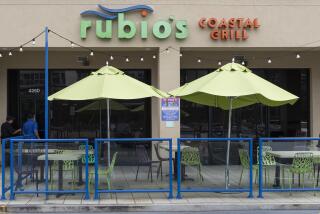Restaurant Finds Handicap Hiring to Be Good Business
- Share via
Richard Burly’s jug ears poked from beneath his Taco Bell cap. Cocking his head to the side, he squinted hard to catch the morning sun off the restaurant’s glass door. The smudges disappeared quickly under his vigorous scrubbing.
“High school kids come in here, put their hands on,” Burly explained, finishing with a swift flourish of the rag. Then he was off to clean the front windows, sweep the lot, scrub the restrooms, and put out the trash before helping behind the counter with drinks and slicing a 42-pound cheese block.
“You tell Richard what to do and show him exactly what you want, he does it,” said Christine Pishos, manager of the Taco Bell on Harbor Boulevard in Fullerton. “He just flies.”
Burly, 40, a mildly retarded man, takes fast food seriously. So do his employers at Taco Bell.
Sam Turner, a district manager for the chain of restaurants, said the firm began hiring developmentally disabled adults in 1987, mostly as a do-good activity, but also for sound business reasons. The company receives tax benefits, and the state and federal governments subsidize the employee’s wages.
Burly was the first person Taco Bell hired in Turner’s North Orange County district.
“That guy is just like you and me,” Turner said. “He will put his nose to the wheel not to fail. They have so much to prove. They want the same things everyone wants: work, esteem. But the bottom line is if they don’t help us make money, they’re unemployed.”
Turner talks a tough bottom line, but that’s explained in part by the way the new workers have proved themselves a smashing success. And, he argues, he sees no point in a patronizing attitude toward people who succeed.
“Any business decision with a bias will hurt your ability to make the right decision,” he says to others who might be interested in employing the developmentally disabled. “Put aside your stereotypes.”
Turner is thrilled with the dozen such employees he has hired in his district. The men and women are hard workers. And they don’t quit in a few months, as many teen-agers do.
“The kids are here for experience, then they move on,” manager Pishos said. “It’s hard work.” Three high school students had quit on her the week before.
Last year, Turner said the turnover at the six restaurants in his district was almost 200%. But only one or two developmentally disabled employees have ever left, he said.
It took Pishos somewhat longer than usual to train Burly, even with the help of a free field worker paid by the state.
At first, Pishos could tell that Burly was trying too hard. Only five cinnamon crisps are supposed to go into each bag of sweets, she said. Burly always stuffed in more. “He didn’t think we put enough in,” she said. “And he’d eat more than he bagged. He doesn’t do that job anymore.”
But Burly has done well. After a year, he was off the government-subsidized pay. Pishos made him a full-time, regular employee at minimum wage. Since then, he has received two raises (to $4.40 an hour) and a bonus award of a portable radio-cassette player for superior work, Pishos said.
As a recent morning shift ended, Burly was wolfing down his lunch of chips and a burrito before the bus ride home to Santa Ana. Spotting a tray left at the next table, he scooped it up and emptied the trash in a waste can before restacking the tray on the counter.
“Make this place nice and pretty,” he said. “Nice and cool. No trash.”
Then he was outside, shedding Taco Bell’s maroon outfit for a yellow and white striped polo shirt. Aviator sunglasses and blue wrist sweatbands completed the picture. Lighting a cigarette, he suavely waved good-bye to the fry cook who teased him in Spanish.
Burly grinned and yelled back, “Oh, yeah?”
Loping down the sidewalk toward the bus stop, he carried the studied airs of many a cool teen-ager before him who wouldn’t be caught dead out in the real world wearing his fast-food uniform.
More to Read
Eat your way across L.A.
Get our weekly Tasting Notes newsletter for reviews, news and more.
You may occasionally receive promotional content from the Los Angeles Times.










